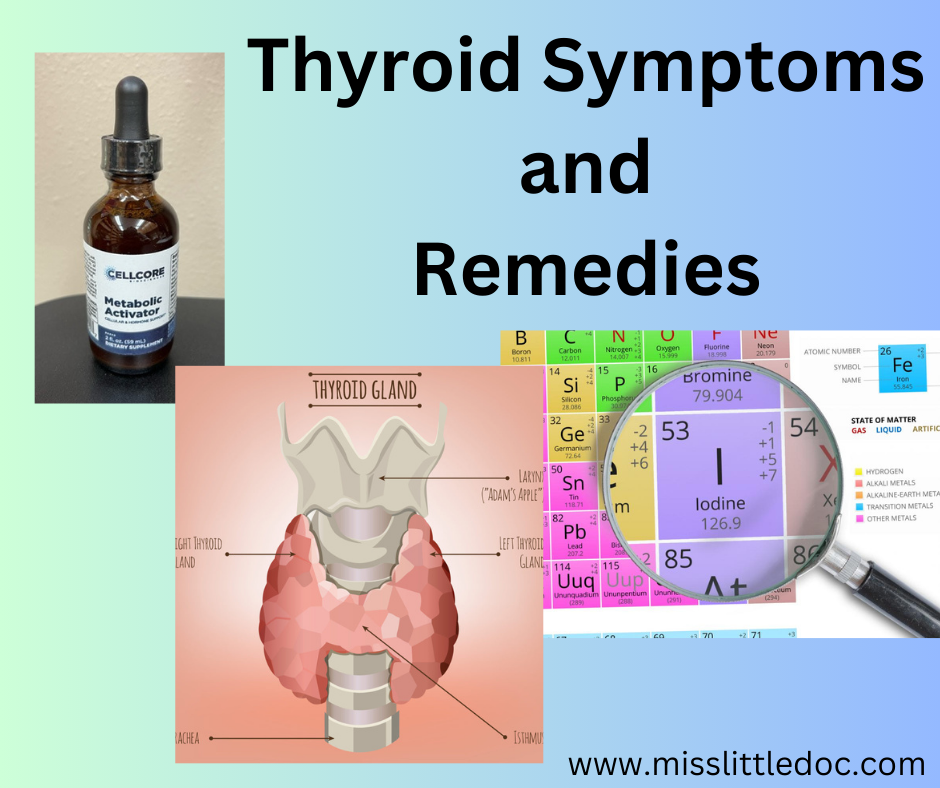Thyroid Symptoms
The thyroid is a butterfly shaped gland that is in your neck. The thyroid gland takes iodine, found in many foods, and converts it into thyroxine (T4) and triiodothyronine (T3). T3 and T4 regulate your metabolism, heart rate, and body temperature. Low body temperature is an indication of a thyroid problem!
The thyroid gland is under is controlled of the pituitary gland. The pituitary gland is a small gland in your brain that produces hormones. When T3 and T4 drop too low, the pituitary gland secretes Thyroid Stimulating Hormone (TSH). TSH causes the thyroid to produce more T3 and T4. Stress is one of the things that slows down the conversion of T4 to T3. So illness, cortisol, a stressful life and excessive dieting are the things that impair T4 to T3 conversion.

When is Something Wrong?
Hypothyroidism: Dry skin and hair, forgetfulness, constipation, a rundown feeling, muscle cramps, unexplained weight gain, heavier/irregular menstrual flow, swelling in the face, heightened sensitivity to cold, obesity, sexual dysfunction, swelling, fibromyalgia, low body temperature and headaches!
Hyperthyroidism: Irritability, increased perspiration, racing heartbeat, difficulty sleeping, frequent bowel movements, unexplained weight loss, less frequent and lighter periods, bulging eyes, shaky hands.
- Your fertility: Thyroid hormones influence your menstrual cycle. When they’re out of whack, you might have irregular ovulation and periods. One study showed 75% of women with PMS had subclinical hypothyroidism, and in over 60% of them their was complete resolution of their PMS when they were treated with T4.
- Your bones: The rate at which old bone is broken down is driven by thyroid hormones; when that process speeds up, bone is destroyed faster than it can be replaced—which can lead to osteoporosis.
- Your weight: Because the thyroid regulates your metabolism, an overactive thyroid, or hyperthyroidism, is linked to weight loss. Hypothyroidism is linked to weight gain.
- Your brain: Low thyroid levels can bring on forgetfulness, difficulty concentrating, and depression.
- Your skin: When your thyroid is underactive, your body stops making and shedding skin cells at its normal pace. Cells build up, causing dry, dull-looking skin. Hair and nail growth slow down as well.

Thyroid issues are five to eight times more likely in women. This is due to estrogen. Thyroid cells have a large concentration of estrogen receptors, which means they are extra sensitive to the effects of the female sex hormone.
How to Keep Your Thyroid Healthy
- Switch to glassware. Bisphenol A (BPA) is a monomer commonly found in plastic goods like water bottles. BPA can affect your thyroid health. A study published in the The Journal of Clinical Endocrinology & Metabolism has found links with this chemical negatively affecting your thyroid.
- Up your intake of B12. A study by the “Journal Of Pakistan Medical Association” found that there is a link between a Vitamin B12 deficiency and hypothyroidism. B12-rich foods to eat are beef, trout, salmon, and eggs.
- Get 8 hours of sleep a night. Fatigue can be a symptom of an unhealthy thyroid, so making sure you get enough rest is important. It can keep your thyroid functioning normally and effectively.
- Quit smoking. Smoking can reduce the amount of hormones your thyroid produces.
- Go gluten free. A 2002 study published in the “Journal of European Endocrinology” found that there was a correlation between people who eat a lot of gluten and people who have a less active thyroid.
- Stay away from fluoride. A 2015 study in the “Journal of Epidemiology & Community Health” found a link between fluoride consumption and a higher rate of inactive thyroids.
- Stop consuming soy protein isolates. Soy can inhibit thyroid function and act as a phyto-estrogen (more estrogen, less thyroid hormone). So stay away from soy foods like soy cheese, soy yogurt, energy bars with soy protein isolate, soy burgers and soy-based meats.
- Keep your gut healthy! Take probiotics. Also take a digestive enzyme (we give our patients Heprotase). The difference is that a digestive enzyme helps digest carbs, fats and proteins and a probiotic helps replenish your gut bacteria.
- Metabolic Activator. Supports hormonal function, glucose metabolism and conversion of thyroid hormones.
Metabolic Activator
Metabolic Activator is a comprehensive metabolic support liquid supplement. Its unique combination of key nutrients work together to provide powerful support for healthy metabolic, thyroid and mitochondrial function. Metabolic Activator combines iodine with Coleus forskohlii extract, selenium, potassium iodide, riboflavin, and molybdenum, which work synergistically to support thyroid and metabolic activity. CellCores Carbon Technology helps to aid absorption and protect and drive each nutrient to where it needs to go in the body. It supports hormonal function, including sex hormones, glucose metabolism and the conversion of thyroid hormones (T4 to T3). Metabolic Activator can assist in upregulating production of cyclic AMP (cAMP), aid healthy antioxidant balance, and support healthy weight management.
Chiropractic Care
Keeping your body functioning with chiropractic care, keeps your organs, glands and tissues functioning at optimum. The spine encases the nervous system which controls all functions of the body. Adjusting the spine resets the brain, in turn making the body send out signals that are more appropriate.
Chiropractic care along with other options can help reduce symptoms of thyroid dysfunction. If you have any questions, give us a call, or a chiropractor near you.
~Dr. Lacey~
Carder Chiropractic Clinic, INC.
El Reno, OK 73036



